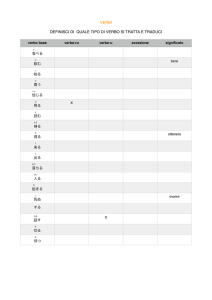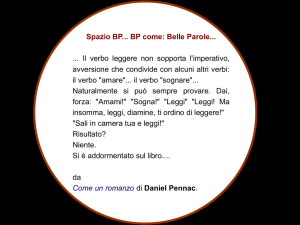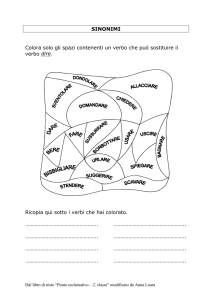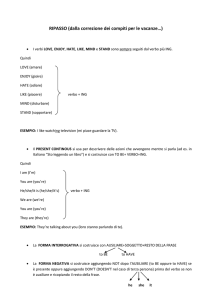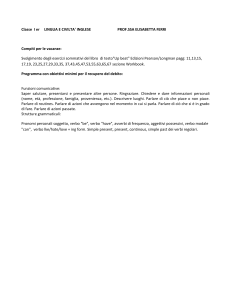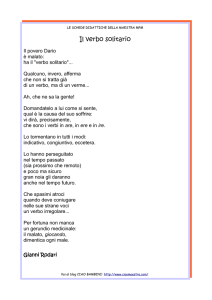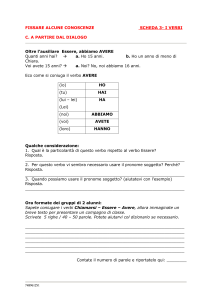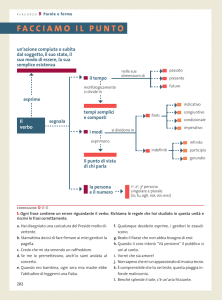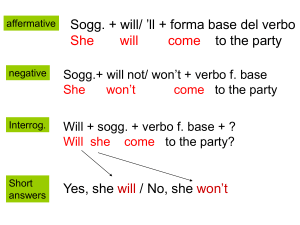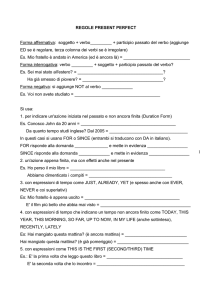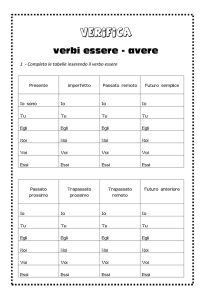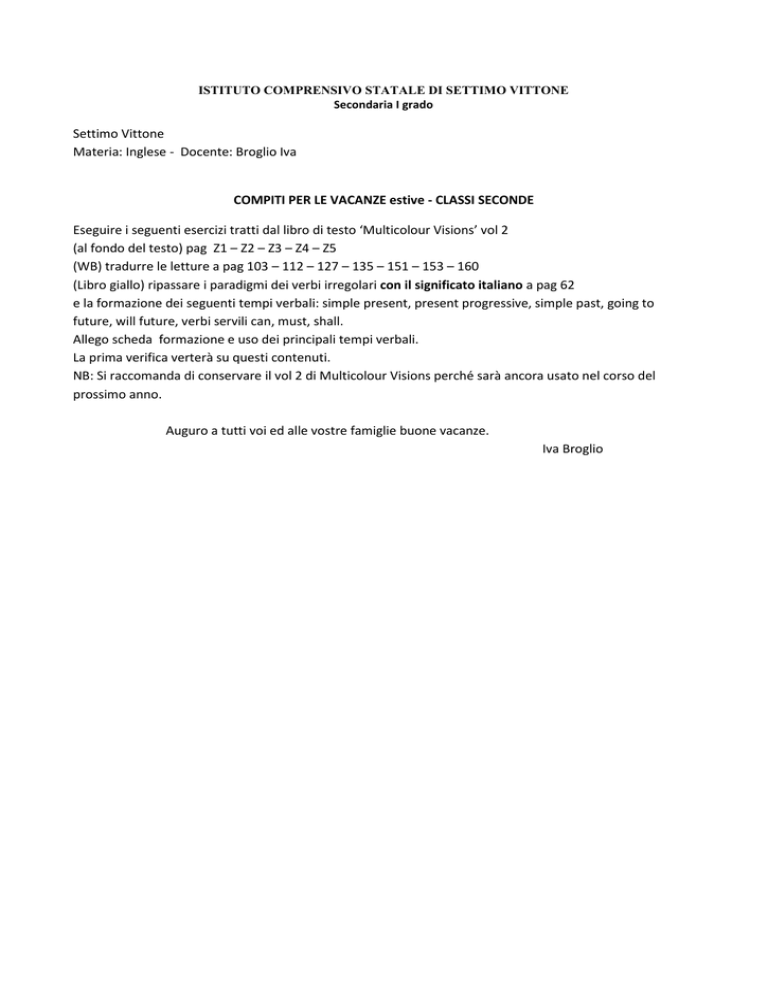
ISTITUTO COMPRENSIVO STATALE DI SETTIMO VITTONE
Secondaria I grado
Settimo Vittone
Materia: Inglese - Docente: Broglio Iva
COMPITI PER LE VACANZE estive - CLASSI SECONDE
Eseguire i seguenti esercizi tratti dal libro di testo ‘Multicolour Visions’ vol 2
(al fondo del testo) pag Z1 – Z2 – Z3 – Z4 – Z5
(WB) tradurre le letture a pag 103 – 112 – 127 – 135 – 151 – 153 – 160
(Libro giallo) ripassare i paradigmi dei verbi irregolari con il significato italiano a pag 62
e la formazione dei seguenti tempi verbali: simple present, present progressive, simple past, going to
future, will future, verbi servili can, must, shall.
Allego scheda formazione e uso dei principali tempi verbali.
La prima verifica verterà su questi contenuti.
NB: Si raccomanda di conservare il vol 2 di Multicolour Visions perché sarà ancora usato nel corso del
prossimo anno.
Auguro a tutti voi ed alle vostre famiglie buone vacanze.
Iva Broglio
TEMPI VERBALI E LORO USO
PRESENT SIMPLE
Affermativo
Interrogativo
Negativo
I/you/we/you/they + verbo base
Do + I/you/we/you/they + verbo base?
I/you/we/you/they + don’t + verbo base
He/she/it + verbo base+s
Does+ he/she/it + verbo base?
He/she/it + doesn’t + verbo base
Uso:
Si usa con le seguenti espressioni di tempo:
Abitudini/Routine
always, normally, often, quite often, sometimes, rarely,
Situazioni permanenti
seldom, never
Eventi futuri legati a un orario predefinito (treni, negozi, cinema
ecc.)
PRESENT CONTINUOUS
Affermativo
I + am + verbo + ing
He/she/it + is + verbo + ing
You/we/you/they + are + verbo + ing
Interrogativo
Am + I + verbo + ing?
Is + he/she/it + verbo + ing?
Are + you/we/you/hey + verbo + ing?
Negativo
I + am not + verbo + ing
He/she/it + isn’t + verbo + ing
You/we/you/they + aren’t + verbo + ing
Uso: .
-Azioni In corso di svolgimento
Si usa con le seguenti espressioni di tempo:
now, right now, just now, these days, at present, at the
moment, this week/year/month, today, tonight
.Azioni di durata temporanea
-Programmi futuri ben definiti (tempo e luogo già deciso).
Si usa con le seguenti espressioni di tempo:
Tomorrow, tonight, next week, at 3:00, …
PAST SIMPLE DI BE
Affermativo
Interrogativo
Negativo
I/he/she/it + was
Was + I/he/she/it?
I/he/she/it + wasn’t
You/we/you/they + were
Were + you/we/you/they?
You/we/you/they + weren’t
Uso:
Si usa con le seguenti espressioni di tempo:
Si usa per parlare di azioni iniziate e concluse nel passato
Ago, yesterday, last week/month/year, in 1492
PAST SIMPLE
Affermativo
Interrogativo
Sogg + verbo + ed (verbo regolare)
Do + sogg + verbo base?
Soggetto + verbo II colonna (verbo
he/she/it + verbo base?
irregolare)
Uso:
Si usa per parlare di eventi che si sono conclusi nel passato.
CAN
Affermativo
Interrogativo
Sogg + can + verbo base
Can + sogg + verbo base?
Uso:
Esprimere abilità o capacità
Chiedere permesso o fare una richiesta formale
MUST
Affermativo
Interrogativo
Sogg + must + verbo base
Must + sogg + verbo base?
Uso:
MUST = OBBLIGO
HAVE/HAS TO = OBBLIGO
MUSTN’T = DIVIETO
DON’T HAVE TO/ DOESN’T HAVE TO = NESSUN OBBLIGO
Does+
Negativo
Sogg + don’t + verbo base
Sogg + doesn’t + verbo base
Si usa con le seguenti espressioni di tempo:
Ago, yesterday, last week/month/year, in 1492
Negativo
Sogg + can’t + verbo base
Negativo
Sogg + musn’t + verbo base
BE GOING TO
Affermativo
Interrogativo
I + am +GOING TO + verbo + ing
Am + I + GOING TO + verbo + ing?
He/she/it + is + GOING TO + verbo +
Is + he/she/it +GOING TO + verbo + ing?
ing
Are + you/we/you/they +GOING TO +
You/we/you/they + are + GOING TO +
verbo + ing?
verbo + ing
Uso: .
Indicare qualcosa che sta per accadere nell’immediato
Esprimere l’intenzione di fare qualcosa
Prevedere un evento sulla base di dati evidenti, verificabili
Decisioni prese prima del momento in cui si parla
WILL FUTURE
Affermativo
Interrogativo
Sogg + will + verbo base
Will + sogg + verbo base?
Uso:
Previsioni basate su opinioni
Previsioni basate su ipotesi (non evidenti)
Decisioni prese/offerte fatte nel momento in cui si parla
Eventi futuri certi
Promesse
Negativo
I + am not + GOING TO + verbo + ing
He/she/it + isn’t + GOING TO + verbo + ing
You/we/you/they + aren’t + GOING TO +
verbo + ing
Negativo
Sogg + won’t + verbo base
PRESENT PERFECT
Affermativo
Interrogativo
Negativo
I/you/we/you/they + have + verbo+ed Have + I/you/we/you/they + verbo base? I/you/we/you/they + haven’t + verbo base
(regolare)/
Has+ he/she/it + verbo base?
He/she/it + hasn’t + verbo base
I/you/we/you/they +verbo III colonna
(irregolare)
He/she/it + has + verbo + ed (regolare)
He/she/it + has + verbo III colonna
(irregolare)
Uso:
Si usa con le seguenti espressioni di tempo:
Parlare di azioni che si sono svolte di recente
Just = appena (azione compiuta da poco)
Parlare di azioni che si sono svolte in un momento non
already = già (azione già avvenuta)
determinato del passato.
not yet = non ancora (nelle frasi negative)
yet = già ( nelle frasi interrogative)
ever? = mai? (si usa nella forma interrogativa)
never = mai. Si usa in frasi affermative di senso negativo.
PAST CONTINUOUS/PROGRESSIVE
Affermativo
I/he/she/it + was + verbo + ing
You/we/you/they + were + verbo + ing
Interrogativo
Was+ he/she/it + verbo + ing?
Were + I/you/we/you/they + verbo+ ing?
Uso:
Esprimere azioni, anche contemporanee, che si svolgono nel passato.
Queste azioni talvolta possono essere interrotte da un’azione breve al past simple
Negativo
I /He/she/it + wasn’t + verbo + ing
You/we/you/they + weren’t + verbo + ing

